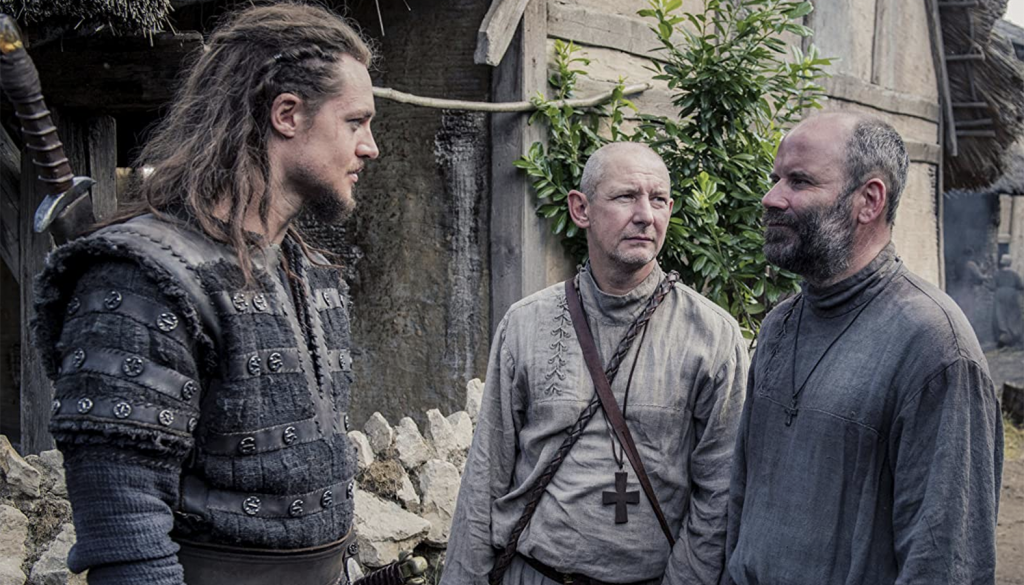“The Last Kingdom” — no, not a series about the United States in 2021 — is a historical series produced by the BBC beginning in 2015 and living a renewed life on Netflix, where I found it.
I’m always a little wary of “historical” fiction, as they tend to impart very “modern” thought processes to personages from centuries ago who couldn’t possibly have thought that way. I don’t know if the dialogue in “The Last Kingdom” is truly authentic, but it feels that way.
England in the ninth century was a tough place to live. What place in the ninth century wasn’t? But things were particularly grim in England then, as the very real Alfred the Great was trying to save the very last kingdom in England that was still in English hands. It seems the Danes had toppled one kingdom of the Saxons after another until only Alfred stood between them and total domination.
The protagonist of the series is a fictional character, a Saxon boy who was to inherit one of those kingdoms, until his father was defeated by the Danes, and the boy was taken and raised like a Viking.
Things get complicated, and, suffice it to say, the protagonist has one foot in pagan culture and one foot in his native Saxon world. It causes all manner of conflict and interesting twists, which make for a solid story line. Just one word of warning: this is Netflix, and the series has its share of R-rated content, which seems to be a requirement of most Netflix shows outside of biopics on Mr. Rogers.
As compelling as this fictional narrative is, it pales in comparison to the real people in this very real story, and not just historical giants like Alfred the Great. There is Father Beocca in “The Last Kingdom.” He may be fictionalized, but there was a real Father Beocca who truly was the spiritual mentor to Alfred the Great, who died a martyr’s death, and was made a saint of the Church.
I don’t know about you, but my clicker is always set on “stun” when I start watching any piece of popular entertainment where a religious person is portrayed — especially if that religious person is an ordained priest. I brace myself for any priest portrayed as some combination of the incarnation of evil, a buffoon, or worse, some kind of crusading “rebel” who denies one or more revealed teachings of the Church.
“The Last Kingdom,” whether intentional or not, gives me a full-throated Father Beocca. He is not an innocent. He is not corrupt. He must guide and navigate a flawed leader like Alfred to become the king that God would want, rather than the man he is when the series begins. Alfred, too, as a serious Christian, is painted in many colors. He seeks virtue but falls into vice regularly. And Father Beocca is always there to help build him back up again.
Even a secondary priest character in “The Last Kingdom” is treated with the kind of depth and richness one just doesn’t see that often in popular entertainment. This character is asked by Alfred to become a hostage to the Danes. He’s frightened — who wouldn’t be? But this simple priest does the king’s bidding for the greater good. How refreshing.
“The Last Kingdom” strikes a modern chord close to home when it sheds light on the divide between the pagan world and the Christian. It can’t make the complete leap of faith and suggest Christianity is superior — it’s the 21st century, after all — but it does present many Christian characters as serious people with a deep faith that they are willing to stand up for in the face of Viking axes and swords.
There are things to be gained by looking back at history, and well-made popular entertainment can help us along. Again, I would wager a small farm that the producers of this series had no intention of creating a pro-Christian, let alone pro-life, message in “The Last Kingdom,” but a back-door view of the pro-life moment does exist.
To the ninth-century Vikings, every inconvenient person and problem can be solved with violence. And as we are about to embark on what many say is the most “progressive” and forward-looking administrations in our country’s short history, the words of St. Teresa of Calcutta resonate loudly: “Any country that accepts abortion is not teaching its people to love, but to use any violence to get what it wants.”

